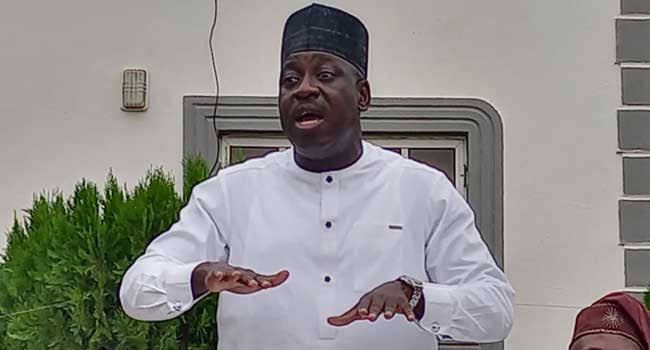The African Democratic Congress (ADC) has vehemently refuted claims of a court injunction against its newly recognized leadership, denouncing the circulating reports as “fake news” propagated by political opportunists. The party clarified that a Federal High Court in Abuja did not restrain Senator David Mark and Ogbeni Rauf Aregbesola from their roles as National Chairman and National Secretary, respectively. Instead, the court denied an ex-parte application filed by Hon. Nafiu Bala Gombe, a self-proclaimed factional chairman, and ordered all parties to appear for a hearing on September 15, 2025. This clarification comes in the wake of media reports suggesting Gombe had secured an injunction against the Mark-led leadership, creating confusion and fueling the ongoing leadership tussle within the party.
The ADC’s National Publicity Secretary, Bola Abdullahi, emphasized that the court explicitly refused Gombe’s application and directed him to formally notify the defendants – Mark and Aregbesola – of the legal proceedings. The court further ordered the defendants to appear before it to demonstrate why the application should not be granted. This procedure underscores the court’s adherence to due process and its refusal to grant any immediate restraints against the recognized leadership. Abdullahi accused those spreading the false reports of being “agents of destabilization” intent on undermining opposition parties through disinformation and misrepresentation of legal proceedings.
The ADC maintains that this misinformation campaign is a desperate attempt to sow discord and disrupt the party’s progress following the Independent National Electoral Commission’s (INEC) official recognition of the Mark-led leadership. The party views this tactic as a continuation of efforts to discredit and destabilize the opposition, alleging that these “political jobbers,” having failed to influence INEC’s decision, have now resorted to manipulating public perception through fabricated court orders. The party’s leadership urged the media and the public to exercise caution and discernment in consuming information, particularly regarding sensitive legal matters, and to be wary of narratives that appear designed to create confusion and undermine the integrity of the political process.
The ADC’s recent leadership transition has been marked by internal disputes and challenges, culminating in the INEC’s formal recognition of Mark and Aregbesola. The party asserts that Gombe’s actions, along with the subsequent dissemination of false information, represent a deliberate attempt to undermine this transition and reignite internal conflict. By framing these actions within the larger context of political maneuvering and the alleged targeting of opposition parties, the ADC aims to portray itself as a victim of politically motivated attacks designed to destabilize its operations and weaken its standing in the political landscape. The party’s emphatic denial of the court injunction and its detailed explanation of the actual court proceedings serve to counter the narrative being promoted by dissenting factions and to reaffirm the legitimacy of its current leadership.
The unfolding events within the ADC highlight the complexities of political leadership transitions and the vulnerability of parties to internal strife and external manipulation. The party’s accusations of targeted disinformation campaigns underscore the increasing prevalence of “fake news” as a tool in political warfare, particularly in the digital age where information spreads rapidly and can be easily manipulated. The ADC’s experience serves as a cautionary tale for other political parties and organizations, emphasizing the importance of transparent communication, robust internal processes, and vigilance against misinformation campaigns that can undermine stability and sow discord.
The ADC’s call for greater media and public scrutiny of information, especially regarding court proceedings, points to the critical role of accurate reporting in safeguarding democratic processes. The party’s claim that the dissemination of false information is a deliberate tactic employed by political rivals raises concerns about the integrity of the information ecosystem and the potential for such tactics to erode public trust in institutions and the political process itself. The ADC’s situation underscores the need for mechanisms to combat disinformation and to promote accurate and responsible reporting, ultimately ensuring a more informed and engaged citizenry capable of making sound political judgments.














